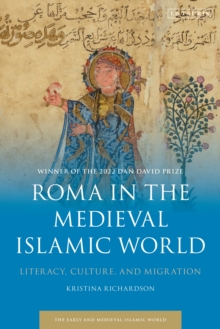Description
| Product ID: | 9780755635818 |
| Product Form: | Paperback / softback |
| Country of Manufacture: | GB |
| Series: | Early and Medieval Islamic World |
| Title: | Roma in the Medieval Islamic World |
| Subtitle: | Literacy, Culture, and Migration |
| Authors: | Author: Kristina Richardson |
| Page Count: | 256 |
| Subjects: | History, Medieval history, Ethnic groups and multicultural studies, Social groups: religious groups and communities, Ethnic minorities & multicultural studies, Islamic studies, Middle East, c 1000 CE to c 1500 |
| Description: | Winner of the 2022 Dan David Prize for outstanding scholarship that illuminates the past and seeks to anchor public discourse in a deeper understanding of historyIn Middle Eastern cities as early as the mid-8th century, the Sons of Sasan begged, trained animals, sold medicinal plants and potions, and told fortunes. They captivated the imagination of Arab writers and playwrights, who immortalized their strange ways in poems, plays, and the Thousand and One Nights. Using a wide range of sources, Richardson investigates the lived experiences of these Sons of Sasan, who changed their name to Ghuraba’ (Strangers) by the late 1200s. This name became the Arabic word for the Roma and Roma-affiliated groups also known under the pejorative term ‘Gypsies’. This book uses mostly Ghuraba’-authored works to understand their tribal organization and professional niches as well as providing a glossary of their language Sin. It also examines the urban homes, neighborhoods, and cemeteries that they constructed. Within these isolated communities they developed and nurtured a deep literary culture and astrological tradition, broadening our appreciation of the cultural contributions of medieval minority communities. Remarkably, the Ghuraba’ began blockprinting textual amulets by the 10th century, centuries before printing on paper arrived in central Europe. When Roma tribes migrated from Ottoman territories into Bavaria and Bohemia in the 1410s, they may have carried this printing technology into the Holy Roman Empire. Winner of the 2022 Dan David Prize for outstanding scholarship that illuminates the past and seeks to anchor public discourse in a deeper understanding of historyWinner of the 2023 Medieval Academy of America Monica H. Green Prize for Distinguished Medieval ResearchHonorable Mention in the 2023 Middle East Medievalists Book PrizeIn Middle Eastern cities as early as the mid-8th century, the Sons of Sasan begged, trained animals, sold medicinal plants and potions, and told fortunes. They captivated the imagination of Arab writers and playwrights, who immortalized their strange ways in poems, plays, and the Thousand and One Nights. Using a wide range of sources, Richardson investigates the lived experiences of these Sons of Sasan, who changed their name to Ghuraba’ (Strangers) by the late 1200s. This name became the Arabic word for the Roma and Roma-affiliated groups also known under the pejorative term ‘Gypsies’. This book uses mostly Ghuraba’-authored works to understand their tribal organization and professional niches as well as providing a glossary of their language Sin. It also examines the urban homes, neighborhoods, and cemeteries that they constructed. Within these isolated communities they developed and nurtured a deep literary culture and astrological tradition, broadening our appreciation of the cultural contributions of medieval minority communities. Remarkably, the Ghuraba’ began blockprinting textual amulets by the 10th century, centuries before printing on paper arrived in central Europe. When Roma tribes migrated from Ottoman territories into Bavaria and Bohemia in the 1410s, they may have carried this printing technology into the Holy Roman Empire. |
| Imprint Name: | I.B. Tauris |
| Publisher Name: | Bloomsbury Publishing PLC |
| Country of Publication: | GB |
| Publishing Date: | 2022-12-01 |


